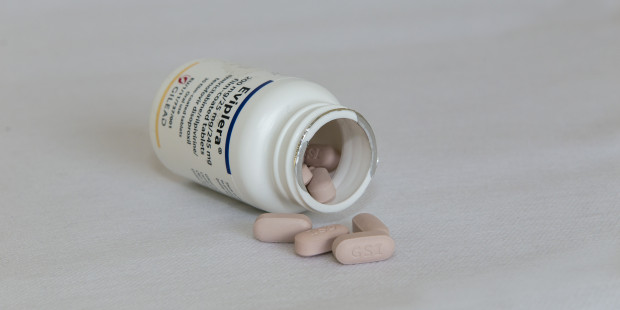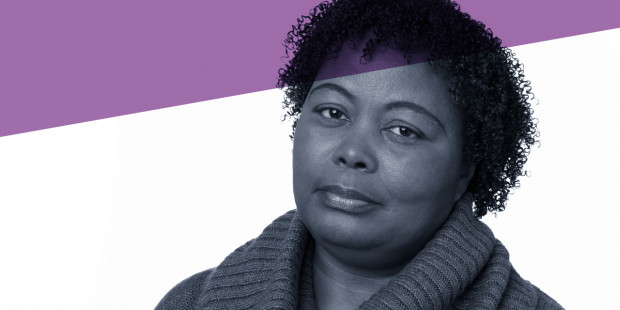What is haemophilia?
Put simply, people with haemophilia bleed for longer if they get a cut. It’s an inherited (genetic) condition which mainly affects men, although women can be carriers (meaning they can pass it on to their sons) and can have a mild form of the condition.
Haemophilia stops the blood clotting process in the body from working properly. Usually, when someone gets a cut, clotting factors in their blood combine with platelets (blood clot cells) to make the blood sticky, which stops the bleeding.
Depending on how much clotting factor the person is missing, their haemophilia could range from mild to severe.
How are haemophilia and HIV connected?
During the late 1970s and early 1980s, haemophilia treatments were made from donated blood. Some of this blood came from people who had HIV or other blood-borne viruses, such as hepatitis C, so thousands of people with haemophilia (or who needed transfusions for other reasons) were infected. This is often referred to as ‘the blood scandal’.
Blood is now screened and factors are heat treated.
Quote textIn the 1970s and 1980s
around
5,000 people with haemophilia and other bleeding disorders were multiply-infected with HIV, hepatitis B and C and a range of other blood-borne viruses. Over 2,400 people have since died and of the 1,200 people infected with HIV less than 250 are still alive.
Many haemophiliacs did not know that they had been infected until years later – this led to many partners and children also becoming infected. A long battle began with the UK government in a bid to secure compensation.
The All-Party Parliamentary Group on Haemophilia and Contaminated Blood (APPG) reported on this group of people and their struggle to get help and compensation in January 2015.
In 2018 a public inquiry began into the Contaminated Blood Scandal. It is believed to have included the largest number of participants of any UK public inquiry to date.
In 2024, the publication of the Infected Blood Inquiry report was a damning indictment of the way people were treated over decades. Details of a long-overdue compensation scheme were also announced for those impacted by the contaminated blood scandal.
What are the symptoms of haemophilia?
The effects on the body can be anything from quite mild to very severe:
- A cut or graze will not usually cause a problem and can be managed by applying pressure to the area.
- Prolonged bleeding lasting a few days can occur if the person has a larger cut or has had surgery.
- Internal bleeding – bleeding into the joints and muscles, for example after a bump or knock.
- Bleeding into the joints causing lasting damage. Untreated it can cause pain, swelling and stiffness and the area can become hot and tender, leading to mobility problems and joint damage similar to arthritis (arthropathy).
- A head injury can lead to bleeding into the brain and requires urgent treatment. Likewise, swelling caused by a deep muscle injury needs urgent treatment because it can lead to dangerous pressure on the arteries.
Managing haemophilia and HIV
Managing haemophilia, HIV and potentially also hepatitis C is a real challenge to an individual, their medical professionals and the people who care for them.
Someone with all three conditions may have complex needs, both in terms of treatment and support. It’s important that the medical professionals monitoring and treating a patient work closely together, so they’re aware of all the issues involved – such as drug interactions or adherence issues.
There have been some studies to investigate anecdotal evidence of bleeding episodes being increased by HIV drugs in the protease inhibitor class. It’s not clear why this is the case but it’s important that doctors treating haemophiliacs with HIV are aware of it.
If you’re living with both conditions, you may feel a range of emotions. Many people in the APPG report describe feeling angry, let down and that their family life has suffered. Find out more about the current inquiry.
There is support available, although the way it’s managed has recently changed.
Support for people with haemophilia and HIV
The way people with haemophilia who have been infected with hepatitis C and/or HIV receive the financial help they’re entitled to has changed. Previously it was managed by five charities. It is now run by the NHS Business Services Authority (BSA).
Nationally, The Haemophilia Society also offers advice, support, information and services to people with haemophilia, including those affected by HIV.
The Birchgrove Group is a support network of men and women affected by haemophilia and HIV.
Tainted Blood is a campaign for compensation and a public inquiry into the events which led to British haemophiliacs becoming infected with HIV and hepatitis C in the late 1970s and early 1980s.
Support from Terrence Higgins Trust
We are supporting those living with and affected by HIV as a result of the Contaminated Blood Scandal.
Terrence Higgins Trust, which now manages the remaining funds from the Macfarlane Trust, is providing initially up to 24 free counselling sessions per person. To be eligible, you will be a former MFT beneficiary with or affected by HIV as a result of contaminated blood products.
To find out more call 0808 8021221 or email [email protected].
Support and advice is also available from THT Direct via email or on 0808 802 1221.







